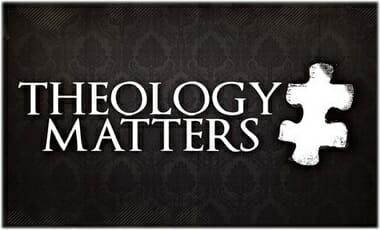Theology 101


The High Calling Of Parenting
In this third part of the summer “Family Series,” Pastor Jackson touches on where the parent/child relationship excels and fails Biblically, giving handy Scriptural reminders and useful tools to inculcate these “weighty measures” place on children and especially parents.
1) Biblical Roles in the Family
2) Worshipfully Prioritize Your Marriage by Faith!
3) The High Calling Of Parenting

Worshipfully Prioritize Your Marriage by Faith!
This past Sunday, Faith Community Church picked back up the summer series of “Faith Matters.” Greg Gifford (WEBSITE | TWITTER) taught on how to apply Scripture to prioritizing your marriage by strengthening the “core” of this all-important relationship. Below are some practical tools to help you prioritize your marriage by faith:
1) DIGITAL BOUNDARIES: This means you need a location to keep your phones while at home so that they are not always on you, and always demanding your attention. A simply priority would be that you do not engage technology before you meaningfully engage your spouse.
2) FIRST FIFTEEN MINUTES PROJECT: Another thing that I encourage couples to all the time is the idea of crystallizing the first fifteen minutes that you are home for each other. This means that the wife stops what she’s doing if she’s home, or the husband stops what he’s doing and you guys take 15 minutes to talk with each other. We have to hang up the phone when our spouse walks in the door. We have to put dinner on hold for a few minutes. This is just a very practical way of saying you matter to me. You’re a priority. Children—be quiet. TV—be quiet. Telephone—be quiet. My spouse is home and they are a priority to me.
3) 3-2-1-1 COMMUNICATION EXERCISE (PDF)
4) INTIMACY INVENTORY (PDF)

Biblical Roles In Family (Summer Sessions)
This is the first sermon in the summer session of 2017 at Faith Community. Over the summer Faith meets for only one service and has children as well as the parents sitting in the pews. This “kickoff” sermon discusses the issues of family and the roles of husband and wife, as well as the kids. A great connection is made to the roles of the Trinity (Father, Son, and Holy Spirit).

You Do Not Know God Without Suffering

This extended quote picks up a few points into Luther’s Heidelberg Disputation, enjoy the suffering…
- Michael Reeves and Tim Chester, Why The Reformation Still Matters (Wheaton, IL: Crossway Books, 2016), 99-105.
In case one is wondering, I highly recommend this book as well as Reeves other book, The Unquenchable Flame: Discovering the Heart of the Reformation. It is the 500th year anniversary of the Reformation… for God’s sake learn about it.
21. The theologian of glory says bad is good and good is bad. The theologian of the cross calls them by their proper name.
This is really quite clear, for as long as a man does not know Christ he does not know God as hidden in sufferings. Such a man, therefore, prefers works to sufferings, and glory to a cross: he prefers powers to weakness, wisdom to foolishness…. These are they the Apostle calls enemies of the cross of Christ. Quite clearly, because they hate the cross and sufferings and certainly love works and the glory that goes with them. And thus they say that the good of the cross is evil, and call the evil of works good. But God is not to be found except in sufferings and in the cross as has been stated already…. It is impossible for a man not to be inflated by his own good works unless the experience of suffering and evil, having previously taken all the spirit out of him and broken him, has taught him that he is nothing and his works are not his own but God’s.
22. The sort of wisdom which sees the invisible things of God in known good works simply inflates a man, and renders him both blind and hard.
This has been said already. For since it is clear that they know nothing about the cross and even hate it, then of necessity they love the opposite, that is wisdom, glory, power and the like….
He who wishes to become wise should not go forward and seek wisdom but should become a fool, go back and seek foolishness. Thus, he who wants to become powerful and famous, to have a good time and enjoy all the good things of life, let him flee from power, fame, enjoyment and a sufficiency of everything and not seek after them. This is the wisdom we are talking about, the wisdom which is foolishness to the world.
The question Luther is addressing is this: How can we know God? There are some visible things humanity could look at: creation, spiritual experiences, miracles. But Luther says that they do not reveal God. Or, rather, they reveal something of God, but it is the kind of knowledge that puffs people up. As a result, people never get beyond their pride to know the real God. This knowledge could “never be enough for a man, nor could it benefit him” (20). People like this think they have knowledge, but they do not—they are fools.
Is God then unknowable? If we cannot know him through what is visible, then can we know him at all? Are we left trying to know God through what is invisible? That is not very promising, because we cannot see it! Luther’s answer is this: God is known through what is contrary. He is known in a hidden way. God’s invisible attributes are revealed in suffering and the cross: glory in shame, wisdom in folly, power in weakness, victory in defeat. God is known through the message of the cross.
So what Luther calls theologia crucis, “the theology of the cross,” is not so much an understanding of how the cross saves us (though, of course, that mattered to Luther). Even more, it is an approach to knowing God. It claims that knowing him starts with the cross. And this starting point turns all our notions of God and how he can be known upside down.
The theology of the cross stems from Luther’s understanding of righteousness and justification. Luther’s great realization was that God justified sinners. God declares to be just those who are unjust. Luther realized that if that is so, human notions of justice can never lead us to understand God’s justice. God’s justice is revealed in the opposite of justice: in the justification of the unjust. Alister McGrath says:
Luther’s discovery of the “wonderful new definition of righteousness” is essentially programmatic, and capable of being applied to other divine attributes… leading ultimately to the theologia crucis, the “theology of the cross”….
…For Luther, the “righteousness of God” is revealed exclusively in the cross, contradicting human preconceptions and expectations of the form that revelation should take.
If knowledge of God could be obtained from what is visible (creation, spiritual experiences, miracles), it would lead to pride. Imagine if we knew God through creation. The people who knew him best would be those with the brains to understand the science of the universe. Or imagine we knew God through spiritual experience. The people who knew God would be those wealthy enough to spend time in contemplation. People would be able to say, “I know God through my intelligence or my spirituality or my morality or my power.” It would lead to pride, and this pride would then obscure the glory and grace of God.
But God determined that he would be known through suffering so that he would be hidden from all those who exalt themselves. Here Luther is echoing the words of Jesus in Matthew 11:25-26: “I thank you, Father, Lord of heaven and earth, that you have hidden these things from the wise and understanding and revealed them to little children; yes, Father, for such was your gracious will.”
The opposite of the theology of the cross are theologies of glory. The theologians of glory pursue wisdom, experience, and miracles and say that suffering is bad. But the theologian of the cross values suffering as that through which God is revealed. Knowledge of God is not found through human wisdom, human powers, or human achievements. It is found in the foolishness of the cross.
The religious leaders at the cross are like theologians of glory. They think God will reveal himself in a powerful act in which Jesus comes down from the cross (Mark 15:29-32). But by faith the centurion sees God revealed in the suffering and abandonment of Jesus (Mark 15:39).
Luther talks about God’s “alien work,” opus alienum, his actions which are alien to his nature, but by which he achieves his “proper work,” opus proprium. Sometimes God assaults us in order to break us. In this light, suffering can be seen as a gracious divine gift.
Only someone who has had “all the spirit [taken] out of him and [been] broken” can know God. Often Luther is translated as saying that “humility” is the precondition for knowing God. But the word is really “humiliation.” Only someone who is humiliated before God can truly know him. In other words, Luther is not commending a certain type of piety that paves the way to a better understanding of God. He is saying that we have to come to the end of ourselves before we accept God’s gracious revelation. In another context Luther gave this advice to those who aspired to study theology:
I want you to know how to study theology in the right way. I have practiced this method myself. . . . The method of which I am speaking is the one which the holy king David teaches in Psalm 119. . . . Here you will find three rules. They are frequently proposed throughout the psalm and run thus: oratio, meditatio, tentatio [prayer, meditation, trials].
Trials are a key way in which we learn the truth about God. Luther had in mind verses like these:
Before I was afflicted I went astray,
but now I keep your word. (Ps. 119:67)
It is good for me that I was afflicted,
that I might learn your statutes. (Ps. 119:71)
I know, 0 LORD, that your rules are righteous, and that in faithfulness you have afflicted me. (Ps. 119:75)
It is often trials that move knowledge from our heads and embed it in our hearts.
Luther was skeptical about the value of philosophy in theology. “Theology is heaven, yes even the kingdom of heaven; man however is earth and his speculations are smoke.” Luther, never knowingly understated, described “reason” as the Devil’s whore, a beast and the enemy of God. In fact Luther valued reason in matters of human society. He also valued reason as a tool to order biblical material. But we cannot discover the truth about God through human reason. Quite the opposite—reason leads us astray because the God revealed in the cross is contrary to human expectations.
Instead, to recognize God in the absence of God, to recognize victory in defeat, to recognize glory in shame requires faith. God is known only by faith. And because knowing him requires faith, this is an act of grace.
So God can be known only by those to whom he gives faith. Salvation is by grace alone. We are used to that idea. But it is the same for our knowledge of God. It is not just our salvation that is by faith alone and grace alone. We do not contribute to our knowledge of God. It is all God’s doing. Our knowledge of God is by grace alone. You do not know God because you were cleverer than other people or have greater spiritual insight or spend more time in contemplation. You know God because he has graciously revealed himself to you in the message of the cross. It is an act of grace. God reveals himself in a hidden way in order to safeguard the graciousness of revelation.
So the cross subverts all human notions of glory. The message we proclaim—the message of Christ crucified—is foolishness and weakness in the sight of the world. This is Paul’s point in 1 Corinthians. Indeed, in many ways Luther’s theology of the cross often feels like an extended meditation of 1 Corinthians 1. In 1:23-25 we read:
We preach Christ crucified, a stumbling block to Jews and folly to Gentiles, but to those who are called, both Jews and Greeks, Christ the power of God and the wisdom of God. For the foolishness of God is wiser than men, and the weakness of God is stronger than men.
And with this foolish, weak message of the cross goes a foolish, weak community of the cross.
But God chose what is foolish in the world to shame the wise; God chose what is weak in the world to shame the strong; God chose what is low and despised in the world, even things that are not, to bring to nothing things that are, so that no human being might boast in the presence of God. (1:27-29)
So the cross leaves no scope for human boasting. Instead our one boast is in Christ Jesus, “who became to us wisdom from God, righteousness and sanctification and redemption.” Therefore, “Let the one who boasts, boast in the Lord” (1:30-31).
Let us summarize the key features of Luther’s theology of the cross [McGrath again]:
[…..]
5. God is particularly known through suffering. It is not just that God can be known through suffering, but that he uses suffering to make himself known. And for Luther this encompasses both the sufferings of Christ and the sufferings of the individual. God humiliates us so that we may know him.

Sola Fide: Faith Alone | Erwin Lutzer and R. C. Sproul
College Park Church (April 2017) – Lecture by Erwin Lutzer.
R. C. Sproul speaks on the doctrine of justification by faith alone and how it was debated among Roman Catholic and Protestant Christians.

Theistic Evolution ~ Wayne Grudem
What follows is the section of the book Professor Wayne Grudem was touching on in his class:
- Wayne Grudem, Systematic Theology: An Introduction To Biblical Doctrine (Grand Rapids, MI: Zondervan, 2000), 275-279.

2. Some Theories About Creation Seem Clearly Inconsistent With the Teachings of Scripture. In this section we will examine three types of explanation of the origin of the universe that seem clearly inconsistent with Scripture.
a. Secular Theories: For the sake of completeness we mention here only briefly that any purely secular theories of the origin of the universe would be unacceptable for those who believe in Scripture. A “secular” theory is any theory of the origin of the universe that does not see an infinite-personal God as responsible for creating the universe by intelligent design. Thus, the “big bang” theory (in a secular form in which God is excluded), or any theories that hold that matter has always existed, would be inconsistent with the teaching of Scripture that God created the universe out of nothing, and that he did so for his own glory. (When Darwinian evolution is thought of in a totally materialistic sense, as it most often is, it would belong in this category also.)19
b. Theistic Evolution: Ever since the publication of Charles Darwin’s book Origin of Species by Means of Natural Selection (1859), some Christians have proposed that living organisms came about by the process of evolution that Darwin proposed, but that God guided that process so that the result was just what he wanted it to be. This view is called theistic evolution because it advocates belief in God (it is “theistic”) and in evolution too. Many who hold to theistic evolution would propose that God intervened in the process at some crucial points, usually (1) the creation of matter at the beginning, (2) the creation of the simplest life form, and (3) the creation of man. But, with the possible exception of those points of intervention, theistic evolutionists hold that evolution proceeded in the ways now discovered by natural scientists, and that it was the process that God decided to use in allowing all of the other forms of life on earth to develop. They believe that the random mutation of living things led to the evolution of higher life forms through the fact that those that had an “adaptive advantage” (a mutation that allowed them to be better fitted to survive in their environment) lived when others did not.
Theistic evolutionists are quite prepared to change their views of the way evolution came about, because, according to their standpoint, the Bible does not specify how it happened. It is therefore up to us to discover this through ordinary scientific investigation. They would argue that as we learn more and more about the way in which evolution came about, we are simply learning more and more about the process that God used to bring about the development of life forms.
The objections to theistic evolution are as follows:
1. The clear teaching of Scripture that there is purposefulness in God’s work of creation seems incompatible with the randomness demanded by evolutionary theory. When Scripture reports that God said, “Let the earth bring forth living creatures according to their kinds: cattle and creeping things and beasts of the earth according to their kinds” (Gen. 1:24), it pictures God as doing things intentionally and with a purpose for each thing he does. But this is the opposite of allowing mutations to proceed entirely randomly, with no purpose for the millions of mutations that would have to come about, under evolutionary theory, before a new species could emerge.
The fundamental difference between a biblical view of creation and theistic evolution lies here: the driving force that brings about change and the development of new species in all evolutionary schemes is randomness. Without the random mutation of organisms you do not have evolution in the modem scientific sense at all. Random mutation is the underlying force that brings about eventual development from the simplest to the most complex life forms. But the driving force in the development of new organisms according to Scripture is God’s intelligent design. God created “the great creatures of the sea and every living and moving thing with which the water teems, according to their kinds, and every winged bird according to its kind” (Gen. 1:21 Niv). “God made the wild animals according to their kinds, the livestock according to their kinds, and – all the creatures that move along the ground according to their kinds. And God saw that it was good” (Gen. 1:25 my). These statements seem inconsistent with the idea of God creating or directing or observing millions of random mutations, none of which were “very good” in the way he intended, none of which really were the kinds of plants or animals he wanted to have on the earth. Instead of the straightforward biblical account of God’s creation, the theistic evolution view has to understand events to have occurred something like this:
And God said, “Let the earth bring forth living creatures according to their kinds.” And after three hundred eighty-seven million four hundred ninety-two thousand eight hundred seventy-one attempts, God finally made a mouse that worked.
That may seem a strange explanation, but it is precisely what the theistic evolutionist must postulate for each of the hundreds of thousands of different kinds of plants and animals on the earth: they all developed through a process of random mutation over millions of years, gradually increasing in complexity as occasional mutations turned out to be advantageous to the creature.
A theistic evolutionist may object that God intervened in the process and guided it at many points in the direction he wanted it to go. But once this is allowed then there is purpose and intelligent design in the process—we no longer have evolution at all, because there is no longer random mutation (at the points of divine interaction). No secular evolutionist would accept such intervention by an intelligent, purposeful Creator. But once a Christian agrees to some active, purposeful design by God, then there is no longer any need for randomness or any development emerging from random mutation. Thus we may as well have God immediately creating each distinct creature without thousands of attempts that fail.
2. Scripture pictures God’s creative word as bringing immediate response. When the Bible talks about God’s creative word it emphasizes the power of his word and its ability to accomplish his purpose.
By the word of the LORD the heavens were made,
and all their host by the breath of his mouth.
For he spoke, and it came to be;
he commanded, and it stood forth. (Ps. 33:6, 9)
This kind of statement seems incompatible with the idea that God spoke and after millions of years and millions of random mutations in living things his power brought about the result that he had called for. Rather, as soon as God says, “Let the earth put forth vegetation,” the very next sentence tells us, “And it was so” (Gen. 1:11).
3. When Scripture tells us that God made plants and animals to reproduce “according to their kinds” (Gen. 1:11, 24), it suggests that God created many different types of plants and animals and that, though there would be some differentiation among them (note many different sizes, races, and personal characteristics among human beings!), nonetheless there would be some narrow limits to the kind of change that could come about through genetic mutations.20
4. God’s present active role in creating or forming every living thing that now comes into being is hard to reconcile with the distant “hands off” kind of oversight of evolution that is proposed by theistic evolution. David is able to confess, “You formed my inward parts, you knit me together in my mother’s womb” (Ps. 139:13). And God said to Moses, “Who has made man’s mouth? Who makes him dumb, or deaf, or seeing, or blind? Is it not I, the Lord?” (Ex. 4:11). God makes the grass grow (Ps. 104:14; Matt. 6:30) and feeds the birds (Mau. 6:26) and the other creatures of the forest (Ps. 104:21, 27-30). If God is so involved in causing the growth and development of every step of every living thing even now, does it seem consistent with Scripture to say that these life forms were originally brought about by an evolutionary process directed by random mutation rather than by God’s direct, purposeful creation, and that only after they had been created did he begin his active involvement in directing them each moment?
5. The special creation of Adam, and Eve from him, is a strong reason to break with theistic evolution. Those theistic evolutionists who argue for a special creation of Adam and Eve because of the statements in Genesis 1-2 have really broken with evolutionary theory at the point that is of most concern to human beings anyway. But if, on the basis of Scripture, we insist upon God’s special intervention at the point of the creation of Adam and Eve, then what is to prevent our allowing that God intervened, in a similar way, in the creation of living organisms?
We must realize that the special creation of Adam and Eve as recorded in Scripture shows them to be far different from the nearly animal, just barely human creatures that evolutionists would say were the first humans, creatures who descended from ancestors that were highly developed nonhuman apelike creatures. Scripture pictures the first man and woman, Adam and Eve, as possessing highly developed linguistic, moral, and spiritual abilities from the moment they were created. They can talk with each other. They can even talk with God. They are very different from the nearly animal first humans, descended from nonhuman apelike creatures, of evolutionary theory.
Some may object that Genesis 1-2 does not intend to portray Adam and Eve as literal individuals, but (a) the historical narrative in Genesis continues without a break into the obviously historical material about Abraham (Gen. 12), showing that the author intended the entire section to be historical,21 and (b) in Romans 5:12-21 and 1 Corinthians 15:21-22, 45-49, Paul affirms the existence of the “one man” Adam through whom sin came into the world, and bases his discussion of Christ’s representative work of earning salvation on the previous historical pattern of Adam being a representative for mankind as well. Moreover, the New Testament elsewhere clearly understands Adam and Eve to be historical figures (cf. Luke 3:38; Acts 17:26; 1 Cor. 11:8-9; 2 Cor. 11:3; 1 Tim. 2:13-14). The New Testament also assumes the historicity of the sons of Adam and Eve, Cain (Heb. 11:4; 1 John 3:12; Jude 11) and Abel (Matt. 23:35; Luke 11:51; Heb. 11:4; 12:24).
6. There are many scientific problems with evolutionary theory (see the following section). The increasing number of questions about the validity of the theory of evolution being raised even by non-Christians in various scientific disciplines indicates that anyone who claims to be forced to believe in evolution because the “scientific facts” leave no other option has simply not considered all the evidence on the other side. The scientific data do not force one to accept evolution, and if the scriptural record argues convincingly against it as well, it does not seem to be a valid theory for a Christian to adopt.
It seems most appropriate to conclude in the words of geologist Davis A. Young, “The position of theistic evolutionism as expressed by some of its proponents is not a consistently Christian position. It is not a truly biblical position, for it is based in part on principles that are imported into Christianity.”22 According to Louis Berkhof “theistic evolution is really a child of embarrassment, which calls God in at periodic intervals to help nature over the chasms that yawn at her feet. It is neither the biblical doctrine of creation, nor a consistent theory of evolution.”23
[19] See pp. 279-87 below, for a discussion of Darwinian evolution.
[20] “We do not need to insist that the Hebrew word min (“kind”) corresponds exactly with the biological category “species,” for that is simply a modern means of classifying different living things. But the Hebrew word does seem to indicate a narrow specification of various types of living things. It is used, for example, to speak of several very specific types of animals that bear young and are distinguished according to their “kind.” Scripture speaks of “the falcon according to its kind,” “every raven according to its kind,” “the hawk according to its kind,” “the heron according to its kind,” and “the locust according to its kind” (Lev. 11:14, 15, 16, 19, 22). Other animals that exist according to an individual “kind” are the cricket, grasshopper, great lizard, buzzard, kite, sea gull, and stork (Lev. 11:22, 29; Deut. 14:13, 14, 15, 18). These are very specific kinds of animals, and God created them so that they would reproduce only according to their own “kinds.” It seems that this would allow only for diversification within each of these types of animals (larger or smaller hawks, hawks of different color and with different shapes of beaks, etc.), but certainly not any “macroevolutionary” change into entirely different kinds of birds. (Frair and Davis, A Case for Creation, p. 129, think that “kind” may correspond to family or order today, or else to no precise twentieth-century equivalent.)
[21] Note the phrase “These are the generations of” introducing successive sections in the Genesis narrative at Gen. 2:4 (heavens and the earth); 5:1 (Adam); 6:9 (Noah); 10:1 (the sons of Noah); 11:10 (Shem); 11:27 (Terah, the father of Abraham); 25:12 (Ishmael); 25:19 (Isaac); 36:1 (Esau); and 37:2 (Jacob). The translation of the phrase may differ in various English versions, but the Hebrew expression is the same and literally says, “These are the generations of….” By this literary device the author has introduced various sections of his historical narrative, tying it all together in a unified whole, and indicating that it is to be understood as history-writing of the same sort throughout. If the author intends us to understand Abraham, Isaac, and Jacob as historical figures, then he also intends us to understand Adam and Eve as historical figures.
[22] Davis A. Young, Creation and the Flood: An Alternative to Flood Geology and Theistic Evolution (Grand Rapids: Baker, 1977), p. 38. Young includes a discussion of the views of Richard H. Bube, one of the leading proponents of theistic evolution today (pp. 33-35).
[23] Berkhof, Systematic Theology, pp. 139-40.
BONUS
This is John Mackay’s opening statement in a larger debate that can be found here, on Mackay’s YouTube. Defending the evolutionary position is John Polkinghorne, a retired Physics Professor and is Canon Theologian at Liverpool Cathedral. John Mackay is a young earth creationist who has a background in geology and biology. He has given presentations like this (on various topics) for 30 years.
- John Mackay’s website, Creation Research can be found here: Creation Research (a dated website, needs to be refreshed). The YOUTUBE CHANNEL is way more current.
Faith + Evolution – Although there are some theistic evolutionists in the Intelligent Design Movement (like Michael Behe and William Dembski) they are not radical like the Neo-Darwinian evolutionists. This video shows the many problems of theistic evolution. (Appearances by: Jay Richards, John G. West, Jonathan Wells, Richard Sternberg, Stephen Meyer)

A Skeptic Asks Dennis Prager About The Afterlife…
A great theological short. A short quick response to an issue on the afterlife. See my post on this subject of “evil” here:
➤ Is Evil Proof Against God? Where Does It Come From?
➤ Logical Consequences of Atheism (e.g., Silly Syllogisms)
- 3 of 3
- « Previous
- 1
- 2
- 3







